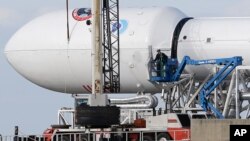A new U.S. satellite is to be launched into space Tuesday to monitor space weather and watch for threatening solar storms.
Liftoff for the U.S. craft, called Deep Space Climate Observatory, or DSCOVR, had been planned for Sunday, but was postponed because of a problem with the radar needed to track the rocket during flight.
The satellite will travel from Cape Canaveral, Florida to a point in space three times farther than the moon where the gravitational pull of the sun and of the Earth cancel each other out. From this outpost, it will document the continuous stream of charged solar particles and give forecasters up to an hour's advance notice of damaging solar storms. The storms can disable electric power grids, knock out satellites and interrupt GPS signals.
The $340 million project is a combined effort of several U.S. government agencies, including NASA, the National Oceanic and Atmospheric Administration, and the Air Force.
The satellite is being launched into space by the private company SpaceX, which has a contract with NASA. The California-based company is also preparing for Tuesday's return of a cargo ship from the International Space Station. SpaceX officials say they are prepared for the simultaneous operations.
The company, owned by billionaire Elon Musk, has a goal to reuse its rockets and will attempt after the launch of DSCOVR Tuesday to recover its rocket from the Atlantic Ocean.





